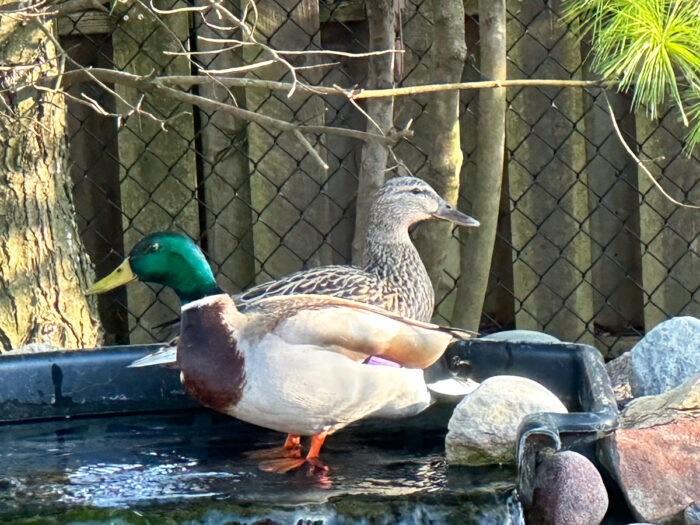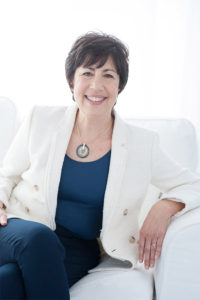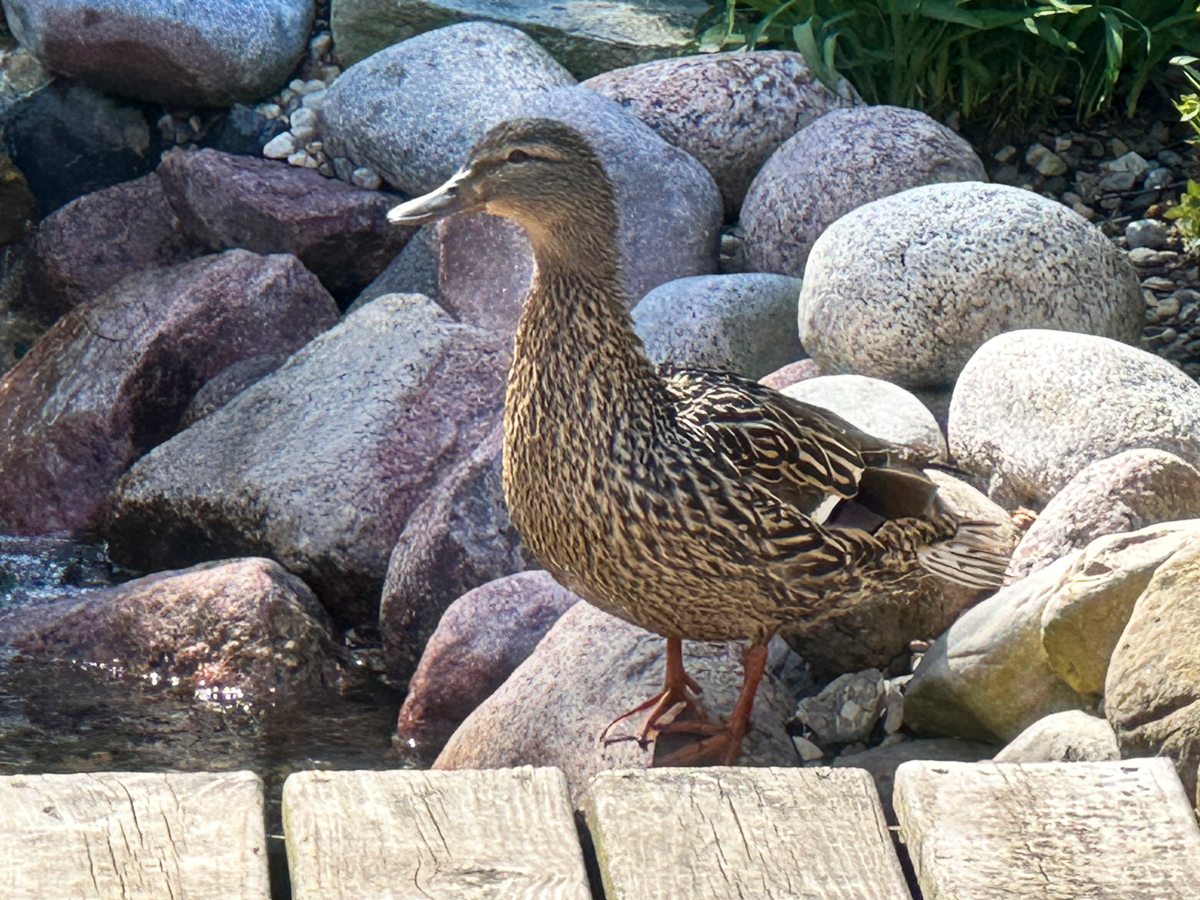🦆 Lessons From a Duck in My Yard:
Using Your Big Brain to Want Less So You Can Have More
Quack, quack. No warning, just squawks – two, three, four. Hmm. Glancing up from my computer and out the window of my second-floor office, I spot the source of the ruckus. A duck – maybe a female mallard – floating down the steps of our backyard pond.
At first, delighted by the unexpected surprise, I quietly enjoy her beauty and behavior. Then, I look more carefully. One-by-one, she is methodically gobbling up all the small goldfish that reside – well, used to reside – in my pond.
We are at war – the battle of the fish. I find myself irritated at the duck’s audacious behavior – She is feasting on my fish, the ones my husband purchased for our stone pond. This is my backyard. I prepare to go out and chase the feathered intruder away.
And then I take a breath. She is beautiful. She is probably hungry. She is a resident of the natural world following her instincts. I wonder if she may need nourishment to ready her body to lay eggs and bring new ducklings into the world. Perhaps she is simply enjoying herself and feeling satisfied at her wondrous find.
I don’t know. In this moment of awakening, I’m aware that there is so much I don’t know about many things. I don’t even know my yard. My pond. My fish. And yet here I am on this beautiful spring morning in midwestern suburbia. Blue sky. Gentle breezes. The scents of newly blooming daffodils and emerging tulips.
Another breath. Another moment. Is this my space or is the duck simply finding food in the natural world? It dawns on me that I have a choice – to dwell on my fish being stolen away by this quacking tan-winged interloper or to notice nature’s beauty and the good fortune that enables me to observe these occurrences in my backyard while I work.
In that flash, I realize I have choices – and I hold the keys to choose my response:
To the situation, how I perceive and experience it;
To myself – what I value, what really matters in the big picture, and how I view my life and my circumstances;
To the natural world and how I view the earth and other living things vs. my own individual wants and needs.

And, my friend, you also have choices. Our thoughts, desires, and behaviors are influenced by our mindsets, the cognitive frameworks we carry about ourselves, each other, and our world (Sanderson, 2019). Our mindsets sometimes tell us that happiness may feel just beyond our grasp. Are there other options? Can we experience greater satisfaction, right here, right now?
Social scientist Arthur Brooks, PhD, professor at Harvard University, explains that the secret to experiencing satisfaction is not about the next thing we get or keep – not about piling up accomplishments, money, or objects, but in managing what we want (Brooks, 2022). Thus, we often attach our wants and needs to unnecessary and inadequate things. According to Brooks, the equation goes something like this: Satisfaction equals what we already have divided by what we want. And the answer is to level off our wants – titrate them so they are manageable. Think of a lump of clay that you can bend to create something beautiful.
Wanting more is human nature – we’re neurobiologically wired to experience dissatisfaction – in some circumstances recognizing our dissatisfaction can help us survive in dangerous situations (Brooks, 2022). But in many aspects of contemporary life, we may not benefit from wanting more stuff that we don’t need – buying more things, winning at the expense of others, thinking of ourselves to the detriment of other living things and our planet. Dr. Brooks reminds us “The secret is to manage our wants. By managing what we want instead of what we have, we give ourselves a chance to lead more satisfied lives” (Brooks, 2022).
And you hold the keys to your own assessment – your needs, wants, values, happiness, satisfactions, and enjoyment.
🌻 I invite you to unveil a closer look at your life. The questions you ask greatly influence the paths of your thoughts, choices, and actions.
Here are five questions to ask yourself:
- What is truly meaningful to you?
- What are your needs?
- What are your wants?
- How do you differentiate between needs and wants?
- Is there a better way to discern?
These 5-steps offer a process for mindful noticing and discernment (Berns-Zare, 2020):
1. Pause. Simply notice the flow of your breath.
2. Listen. Tune into your inner voice. If you choose to, take a few moments to ponder one or more of the ideas and questions offered in this article.
3. Reflect. As you sift through your awareness, what thoughts, feelings, bodily sensations, experiences arise?
4. Discern. Where do you feel called? When you’re ready, consider what direction you may want to move toward.
5. Act. What’s the next right thing? Mindfully choose your next steps for reflection or action.
Will you welcome the ducks eating the fish or scare them away? What are the possibilities?
© 2023 Ilene Berns-Zare, LLC, All Rights Reserved
Disclaimer: This article is for informational purposes only. No content is a substitute for consulting with a qualified mental health or healthcare professional.
Send your comments and suggestions to Ilene!
Click here to send Ilene an email with your thoughts about this blog post.
References:
- Berns-Zare, I. (2020, November 20). Five steps for greater perspective and a positive shift: This 5 step awakening process may help you re-energize, reduce negativity, and gain greater clarity.
- Brooks, A. (2022, February 8). How to want less: The secret to satisfaction has nothing to to do with achievement, money, or stuff.
- Sanderson, C.A. (2019). The positive shift: Mastering mindset to improve happiness, health, and longevity. Dallas, TX: BenBella Books.
Ilene is a Featured Author on PsychologyToday!
Read her blog series Flourish and Thrive: Navigating transitions with mindfulness and resilience.

How are you responding to the metaphorical ducks in your life?
Tap into your strengths, purpose, and potential to flourish in life and work.
If you’d like to discuss how Ilene Berns-Zare Coaching can help you achieve your goals, contact Ilene.
Coaching with Ilene Can Help You Call Yourself to Action
Ilene Berns-Zare, PsyD, PCC, CEC, is an Executive and Personal Coach and Speaker. Ilene helps people live their best personal and professional lives by bringing mind, body, and spirit into flow with strengths, purpose, and potential. She inspires clients to find fresh perspectives and access their full potential as creative, resourceful, whole persons. Find Ilene online, set up a free discovery coaching consultation, and access free resources at https://ibzcoaching.com/.
Please share this blog with anyone who might be interested in reading it!
We would love to hear from you! We are interested in your suggestions for this newsletter, your reactions to this one, or providing more information about coaching.



